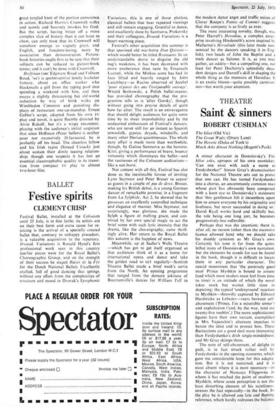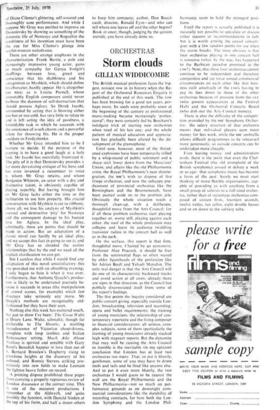THEATRE
Saint & sinners
ROBERT CUSHMAN
The Idiot (Old Vic) The Great Waltz (Drury Lane) The Heretic (Duke of York's) Much Ado About Nothing (Regent's Park) A minor character in Dostoievsky's The idiot asks, apropos of his own monicker, 'Can one exist with such a name as Ferdyshenko?' Simon Gray's dramatisation for the National Theatre sets out to prove that one can. He has turned Ferdyshenko into a chorus, an uncommonly common man whose part has obviously been composed with a keen eye to Dostoievsky's statement that 'this gentleman felt it incumbent upon him to amaze everyone by his originality and liveliness, but never succeeded in doing so.' David Ryall works hard and skilfully but, the role being one long jeer, he becomes progressively less sufferable.
Perhaps that was the intention; there is, after all, no reason (other than the excessive licence allowed him) why we, should take his shoddy cynicism as Mr Gray's own. Certainly his tone is far from the quiet, lethal irony of Dostoievsky's own narration. but the elements he stands for can be found in the book, though it is difficult to locate them in any particular character. The rancid resentment that 'the positively good man' Prince Myshkin is bound to arouse (and which most readers must feel from time to time) is an attitude of which the novel takes stock but wastei little time in depicting; the typical 'underground' reaction to Myshkin—shrewdly captured by Edward Hardwicke as Lebedev—veers between self- abasement ('Prince, I'm a miserable sinner') and exploitation ('and, by the way, lend me twenty-five roubles'.) The more sophisticated figures have their own variant, exemplified in Mrs Yepanchin's alternate impulses to berate the idiot and to protect him. These fluctuations are a good deal more interesting than Ferdyshenko's drab single-mindedness. and Mr Gray skimps them.
The note of self-abasement, of delight in guilt, is in fact struck rather well by Ferdyshenko in the opening moments, which gave me considerable hope for this adapta- tion. But it is not sustained, and it is most absent where it is most necessary—in the character of Nastasya Filippovna in whom it has reached the point of madness. Myshkin, whose acute perception is not the least disturbing element of his saintliness. stresses the fact repeatedly—in the book. In the play he is allowed one late and fleeting reference, which hardly redresses the balance of Diane Cilento's glittering, self-assured and thoroughly sane performance. And while I suppose Mr Gray was entitled to improve on Dostoievsky by showing us something of the domestic life of Nastasya and Rogozhin the tawdriness of his invention must have been the cue for Miss Cilento's plunge into scarlet-woman melodrama.
There are other strange emphases in the characterisation. Frank Barrie, a pale and increasingly impressive young actor, gains so much sympathy for Ganya Ivolgin's shuftlings between love, greed and conscience that his shabbiness and his antagonism to Myshkin, which should define his character, hardly appear. He is_altogether too nice; as is Louise Purnell, whose immutably English composure could never harbour the daemon of self-destruction that should possess Aglaya. So Derek Jacobi, surrounded by acting that is blowing either too hot or too cold, has very little to relate to and is left acting the idea of goodness, a formidable task in which he succeeds with the assistance of much charm and a powerful talent for throwing fits. He is the proper antidote to Ferdyshenko.
Whether Mr Gray intended him to be I hesitate to decide. If the purpose of the evening is to have a good laugh at a holy fool, Mr Jacobi has mercifully frustrated it. The pity of it is that Dostoievsky provides a far more devastating critique of his hero and has even invented a raisonneur to voice it, whom Mr Gray retains, and whom Benjamin Whitrow, an actor with a dry and distinctive talent, is obviously capable of playing superbly. But having brought him on Mr Gray lacks either the time or the inclination to use him properly. His crucial conversation with Myshkin is cut to ribbons; above all, we lose his analysis of Myshkin's asexual and destructive 'pity' for Nastasya and the consequent damage to his human love for Aglaya. In the ideal play, admittedly, these are points that should be made in action. But an adaptation of a classic novel can hardly be an ideal play, and we accept this fact in going to see it; and Mr Gray has so clouded the earlier relationships that by the end we need all the explicit clarification we can get.
Bdt I confess that while I would find any adaptation of this novel unsatisfactory this one provided me with an absorbing evening; I only began to hate it when it was over. Furthermore, that Anthony Quayle's produc- tion is likely to be underrated precisely be- cause it succeeds in areas (the manipulation. of crowd scenes, for example) which few directo.rs take seriously any more. Mr Quayle's methods are recognisably old- fashioned but they have their uses.
Nothing else this week has mattered much, but just to show I've been: The Great Waltz at Drury Lane. Waltz, schmaltz; though far preferable to The Heretic, a startling recrudescence of Victorian closet-drama, complete with limp iambics and Italian Renaissance setting. Much Ado About Nothing is spirited and sensible with Gary Bond's Benedick happier in love than out of it, Bernard Bresslaw's Dogberry rising to grandiose heights at the discovery of his asshood, and Ronnie Stevens striking pro- pitiously into new fields to make Leonato the lightest heavy father on record.
A printing dispute probibited these pages from carrying a properly rapturous review of London Assurance at the correct time. This IS one of the maturest productions I remember at the Aldwych, and quite possibly the funniest, with Donald Sinden at the top of his form, and half a dozen others
to keep him company; author, Don Bouci- cault, director, Ronald Eyre—and who can tell where one leaves off and the other begins? Book at once; though, judging by the queues outside, you have already done so.































 Previous page
Previous page